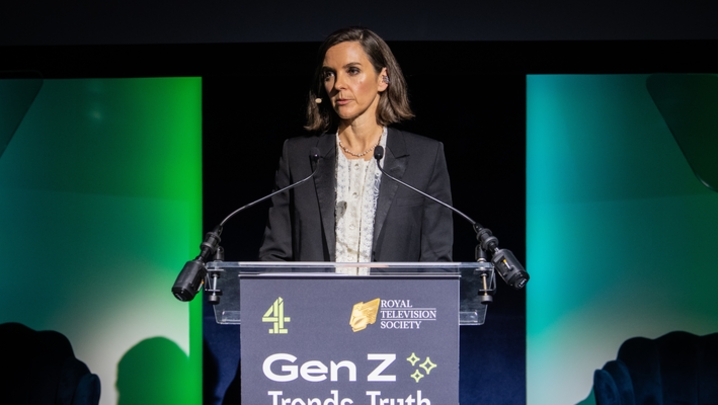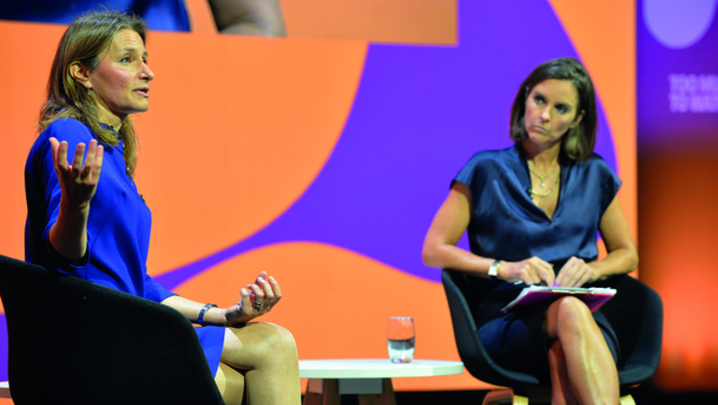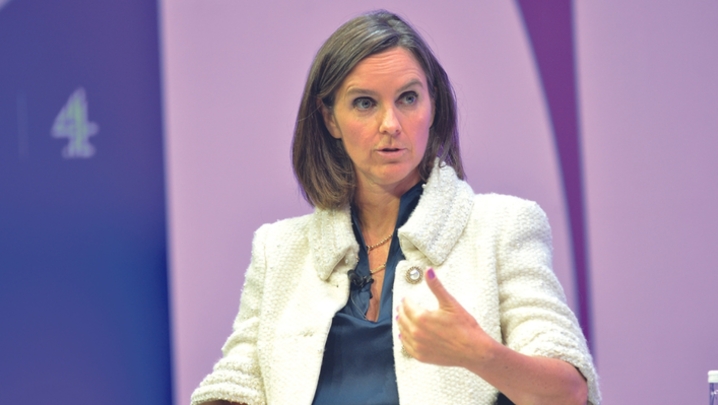Alex Mahon’s appointment as Channel 4’s new CEO is a harbinger of change at the broadcaster, predicts Maggie Brown.
On 5 June, Channel 4’s Chairman, Charles Gurassa, announced that Alex Mahon, best known for her business deals alongside Elisabeth Murdoch at Shine, was to be the broadcaster’s seventh chief executive. When she arrives in the autumn, she will have to take a number of critical decisions that will require every bit of her famously big brain.
The decision to hire Mahon, backed unanimously by the board, conforms to Channel 4’s steely tradition of looking outside for a new CEO, rather than internally. If the past is anything to go by, a major shake-up is on the cards, during what are challenging times for all legacy TV companies.
Not only is Mahon, at 43, the first woman in the post, she is also the first from the programme-supply sector. In other words, she is accustomed to negotiating with the broadcaster’s tough commercial executives on programmes, from One Born Every Minute to Humans.
Ahead of the announcement, on 2 June, the spurned creative director, Jay Hunt, said that she would be leaving in September.
This clears the way for Mahon to appoint a successor, and to amend the current management structure, especially in programme commissioning, which is judged by some to have concentrated too much decision-making power at the top of the pyramid. This may have contributed to flagging ratings and an exodus of talented staffers.
Mahon is expected to review the crucial advertiser-funded All 4 platform, which evolved from the 4oD portal established in 2006 and which was relaunched last year. This has been transformed by David Abraham’s data policy of registering users, but there has been a debate about what bespoke programming it should commission.
One area where Mahon lacks experience is advertising sales, which account for 95% of Channel 4’s revenue. The innovative sales director Jonathan Allan may be given an enhanced role in the new regime.
A few hours after Gurassa’s announcement, the straight-talking Mahon sent an excited internal message to the broadcaster’s 830 staff. She said it would be an “utter privilege” to work there and struck a decidedly warm note: “Every time I walk over the glass bridge into the Channel 4 building, I feel a shiver of excitement; the visceral feeling of a place where people exist to make positive change happen, where the very point is to innovate, to challenge, and where distinctiveness is so apparent.”
“I thought she was brilliant, she’s so very quick, probably one of the best minds I ever came across in television.”
For good measure, she linked the two words – risk and failure – that accompany the search for fresh content: “Channel 4 continues to have an incredible ability to build brands out of programmes and films, strands, talent… For me, to generate that innovation means taking risks, pursuing creative excellence relentlessly, and it means accepting that failures are an inevitable by-product of the process of birthing fresh, outstanding ideas”.
Key to Mahon’s appointment it that she met virtually all the five testing criteria the board had set, at a time of “numerous challenges”.
The criteria ranged from having “a demonstrable understanding of the Channel 4 remit and a track record of innovation and risk-taking” to “a deep understanding of international markets”.
Then, as the head hunters delved deeper into her background, “extensive references” from within the television industry showed that Mahon was “an outstanding leader, both greatly respected and liked”, Gurassa told the Guardian.
“In a creative organisation such as Channel 4, that leadership is very important and significant,” he said.
These personable qualities will help in the political sphere. Mahon served on the DCMS’s BBC Charter advisory committee. This brought her into contact with returning culture secretary Karen Bradley.
For two years, Abraham – joined by Gurassa – conducted a noisy campaign against privatisation. But the relationship with government now needs to be reset.
The Channel 4 board is still working out its position on the less inflammatory issue of relocation.
Equally significantly, it is also thinking about: increasing the quota of shows commissioned from the nations and regions; the overall scale of investment in the production sector; running down its cash surpluses; and looking at ways to diversify income.
Bradley’s consultation formally ended on 5 July. Mahon did not nail her colours to the mast and expects to work with the board on its response to the DCMS evidence.
As with Abraham and his predecessor, Andy Duncan, Mahon is not a programme-maker. But much of her career has been spent in the wider television industry. She will join Channel 4 after nearly two years running Foundry, a visual-effects software firm, whose credits include the films Gravity and Guardians of the Galaxy.
Mahon has dual nationality. Her father is American. Her Scottish mother and stepfather ran a pharmacy, and she was raised from the age of five in Edinburgh in an environment of ringing tills.
She took a degree in physics and Italian at Imperial College London, and then a doctorate in medical physics.
Highly numerate, she became a management consultant with the select Mitchell Madison Group, formed by former McKinsey people.
One of the clients she worked for was RTL, owned by Bertelsmann, when it was briefly run by former Capital Radio executive Richard Eyre. She subsequently joined RTL’s strategy team.
The group was assimilating Pearson Television, which included the Thames Television production arm and US and Australian acquisitions including Grundy, maker of Neighbours. She switched her focus from group strategy to the resulting FremantleMedia conglomerate. There, she was tasked with sorting out its structure. She honed her acquisition skills by purchasing companies in Australia, Germany and Japan under the eye of her boss, Tony Cohen.
“I thought she was brilliant, she’s so very quick, probably one of the best minds I ever came across in television,” says Cohen.
On the Fremantle board she met Peter Fincham, then running TalkbackThames and a master at schmoozing talent. Impressed, he invited her across to become commercial director.
Her next job was chief operating officer at TalkbackThames. At the time, the company was enjoying huge success with The X Factor and producing The Bill for ITV. Additionally, Talkback supplied a range of Channel 4 programmes, from Grand Designs and Property Ladder to How Clean Is Your House?
In 2006, out of the blue, Mahon was emailed by Elisabeth Murdoch, who had founded Shine TV on the back of sweetheart commissions from Sky in 2001. She had access to capital and a vision of building a big international production company, but needed a partner.
Mahon was pregnant with her first (of four) when she joined Shine in November 2006. Her decision to leave a well-paid job was greeted with surprise, and RTL Chief Executive Gerhard Zeiler said she was welcome back any time.
Mahon frequently rises at 5:00am to spend an hour in the gym before her children wake up. Those who have worked with her recount how she would go for a 5km run following an 11-hour flight to Los Angeles. Once she had showered, Mahon would then join colleagues in the bar.
Murdoch and Mahon made a formidable team and the move to Shine demonstrated Mahon’s need to be challenged.
There, she proceeded to strike deals fast. The two important ones in the UK were, arguably, Dragonfly, an expert in fixed-rig shows such as the pioneering One Born Every Minute, and Kudos, maker of Spooks and Broadchurch.
When Shine was acquired by 21st Century Fox in 2011 for £415m, it was the UK’s largest independent producer. However, the deal saw Murdoch exit with a £130m or so profit and there was shareholder controversy over the significant debts built up by Shine.
Mahon became group president. Fox then made Shine part of a global powerhouse by creating a joint venture with private equity Apollo Global Management, which controlled Endemol and Core Media (producer of American Idol).
When Shine and Endemol merged in 2014, the top job, which involved significant rationalisation, was taken by former Sky executive Sophie Turner-Laing.
Channel 4’s board is betting that Mahon, after 17 years in the broadcasting sector, has seen enough of the global TV industry to cherish what public service Channel 4 stands for, while applying her extensive knowledge to strengthen it.
The challenges facing Channel 4
The specific issues facing Channel 4 include the tricky task of hitting its advertising revenue targets in a slowing economy. This, naturally, impacts on its programme budget, which has to finance remit shows such as Channel 4 News.
In this context, the costly Great British Bake Off, bought for £75m in a three-series deal, could be a mixed blessing, since it was justified as a show that could subsidise less-popular programmes.
It was bought partly to prevent ITV getting it. The hope is that Bake Off will attract more light viewers to Channel 4 and be a commercial success. There is speculation, however, that landing a big sponsorship deal is proving difficult.
This could put the broadcaster under pressure to reduce its overhead costs at a time when its audience is eroding.
Not only is total viewership for the core channel and its digital offshoots down, but the make-up of those audiences is changing. For instance, the commercially important, but fickle, demographic of 16- to 34-year-olds is down by around 10% compared with last year as channel loyalty fades.
The core channel relies on a combination of the Channel 4+1 channel and 4seven’s popular repeats to get close to a 6% overall audience share.
Ofcom is concerned about whether Channel 4 can maintain its impact, as the broadcaster is assailed from all sides. Channel 5’s much smaller commissioning team is encroaching on Channel 4’s factual-programming turf. Netflix has poached the distinctive Black Mirror and even denied Channel 4 a terrestrial window. ITV outbid it for Family Guy, and there is increasing competition for acquired series.
So far, with the exception of Humans, Channel 4 has been disappointed in its efforts to find several returning drama series to replace Shameless.
The channel has been criticised for its reliance on long-running – possibly overfamiliar – fixed-rig series at 9:00pm as tent poles of the evening schedule.
A tendency to overdose or binge on hits, from Gogglebox to First Dates and The Last Leg, can make Channel 4 seem like an ill-disciplined teenager.
The malaise extends to sport: ITV now has the lucrative racing slate. This had allowed Channel 4 to create a bidding war among bookies between 2013 and 2016. And, from 2019, Formula One will go exclusively to Sky.
Sky also has an advantage over Channel 4 online: Sky’s AdSmart system permits users to block adverts – which the All 4 platform, for all its treasure trove of big data on registered users, does not support.
Mahon needs to decide whether to allow ad blocking on All 4, for a fee, as the ITV Hub does. Some commissioners support this.






